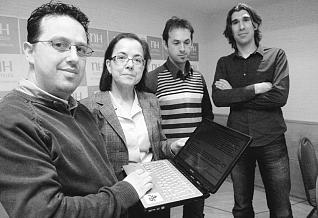The Ubuntu team is pleased to announce the Release Candidate for Ubuntu 10.04 LTS (Long-Term Support) Desktop and Server Editions and Ubuntu 10.04 LTS Server for Ubuntu Enterprise Cloud (UEC) and Amazon’s EC2, as well as Ubuntu 10.04 Netbook Edition. Codenamed "Lucid Lynx", 10.04 LTS continues Ubuntu’s proud tradition of integrating the latest and greatest open source technologies into a high-quality, easy-to-use Linux distribution.
We consider this release candidate to be complete, stable, and suitable for testing by any user.
Ubuntu 10.04 LTS Desktop Edition and Ubuntu 10.04 Netbook Edition continue the trend of ever-faster boot speeds, with improved startup times and a streamlined, smoother boot experience.
Ubuntu 10.04 LTS Server Edition provides even better integration of the Ubuntu Enterprise Cloud, with its install-time cloud setup.
Ubuntu 10.04 LTS Server for UEC and EC2 brings the power and stability of the Ubuntu Server Edition to cloud computing, whether you’re using Amazon EC2 or your own Ubuntu Enterprise Cloud.
The Ubuntu 10.04 family of variants, Kubuntu, Xubuntu, Edubuntu, Ubuntu Studio, and Mythbuntu, also reach beta status today.
The final release of Ubuntu 10.04 LTS is scheduled for 29 April 2010 and will be supported for three years on desktops and five years on servers.
Before installing or upgrading to Ubuntu 10.04 LTS, please review the instructions and caveats in the release notes:
http://www.ubuntu.com/getubuntu/releasenotes/1004
In addition, there are a small number of known bugs in the release candidate that will be fixed before the Ubuntu 10.04 LTS release, but warrant highlighting for your attention:
http://www.ubuntu.com/getubuntu/releasenotes/1004overview#Known%20issues
About The Release Candidate
—————————————-
The purpose of the Release Candidate is to solicit one last round of testing before the final release. Here are ways that you can help:
- Upgrade from Ubuntu 8.04 LTS or Ubuntu 9.10 to the Release Candidate by following the instructions in the release notes referenced above.
- Participate in installation testing using the Release Candidate CD images, by following the testing and reporting instructions at http://wiki.ubuntu.com/Testing/ISO
Desktop features
————————
Social from the start: We now feature built-in integration with Twitter, identi.ca, Facebook, and other social networks with the MeMenu in the panel.
New Design: Cleaner and faster boot, new notification area, new themes, new icons, and new wallpaper bring a dramatically updated look and feel to Ubuntu.
Ubuntu One: Synchronize any folder in your home directory, publish files to share with the Internet directly from your Ubuntu desktop, manage more sync settings with the Ubuntu One Preferences application, use Rhythmbox to choose from millions of songs available for purchase in the Ubuntu One Music Store. Learn more at:
Server features
———————-
Cloud computing: The Ubuntu Enterprise Cloud installer has been vastly improved in order to support alternative installation topologies. UEC components are now automatically discovered and registered, even when the storage controller, cluster controller and walrus are installed on different servers. Finally, UEC is now powered by the latest Eucalyptus version 1.6.2.
UEC and EC2: Ubuntu 10.04 LTS continues the tradition of official Ubuntu Server image releases for UEC and for Amazon’s EC2, giving you everything you need for rapid deployment of Ubuntu instances in a cloud computing environment. UEC images, and information on running Ubuntu 10.04 on EC2, are available at:
http://uec-images.ubuntu.com/releases/10.04/rc
Stability and security: Ubuntu 10.04 LTS brings many improvements over Ubuntu 8.04 LTS to keep your servers safe and secure for the next five years, including AppArmor profiles for many key services, kernel hardening, and an easy-to-configure firewall.
Ubuntu Netbook features
———————————-
Ubuntu Netbook Edition is optimised to run on Intel atom based netbooks. It includes a new consumer-friendly interface that allows users to quickly and easily get on-line and use their favourite applications. This interface is optimised for a retail sales environment.
It includes the same faster boot times and improved boot experience as Ubuntu desktop.
Ubuntu Netbook on ARM
——————————-
The ARM optimised variant of Ubuntu Netbook comes with a lightweight application selection tailored specifically for ARM deployments, including a web-based office and mail solution and a launcher that works with and without graphics acceleration.
Kubuntu features
————————
Kubuntu 10.04 LTS will be the first LTS to feature KDE 4 Platform and Applications. KDE 4 has come a long way since its early releases and is now suitable for the high demands of LTS users. Being an LTS we have focused on bug fixing and stability for this release, but we did find time to add features such as touchpad configuration, Firefox KDE integration, Kubuntu notification improvements, and cross-desktop systray menu standardisation. Kubuntu features the Plasma Desktop while Kubuntu Netbook Remix comes out of preview status with the Plasma Netbook workspace.
See https://wiki.kubuntu.org/LucidLynx/RC/Kubuntu for more details.
Edubuntu features
————————-
Edubuntu 10.04 includes many new features, updates and fixes. Some highlights include:
LTSP and the Ubuntu Netbook Remix interface can now be installed from the Live DVD right after system installation. The disc also features Live LTSP, which allows you to try out LTSP without making any permanent changes to your machine.
New and updated software, including a new menu editor for menus that can be applied to user profiles. GBrainy is a new program in the Edubuntu suite that excercises your brain.
A new icon theme which uses more descriptive icons, a new wallpaper and boot splash screen as well as more subtle window theming that is easier on the eyes.
Mythbuntu features
—————————
Mythbuntu 10.04 introduces MythTV 0.23. This new version is significantly faster and should feel more responsive and stable than older versions. It also integrates better into the OS with better support for things like ConsoleKit and Upstart.
Please see http://www.mythtv.org/wiki/Release_Notes_-_0.23 for more details about changes introduced in 0.23.
See http://mythbuntu.org/10.04/rc for information about the Mythbuntu beta release.
A more complete tour of the features new in 10.04 LTS can be found at http://www.ubuntu.com/getubuntu/releasenotes/1004overview
About Ubuntu
——————
Ubuntu is a full-featured Linux distribution for desktops, laptops, netbooks and servers, with a fast and easy installation and regular releases. A tightly-integrated selection of excellent applications is included, and an incredible variety of add-on software is just a few clicks away.
Professional services including support are available from Canonical and hundreds of other companies around the world. For more information about support, visit http://www.ubuntu.com/support
To Get the Ubuntu 10.04 LTS Release Candidate
——————————————————————-
To upgrade to Ubuntu 10.04 LTS Release Candidate from Ubuntu 9.10 or Ubuntu 8.04 LTS, follow these instructions:
https://help.ubuntu.com/community/LucidUpgrades
Or, to perform a new installation or try out 10.04 LTS "live" from CD, download the Ubuntu 10.04 LTS Release Candidate here (choose the mirror closest to you):
Africa:
* http://bw.releases.ubuntu.com/10.04 (Botswana)
* http://ls.releases.ubuntu.com/10.04 (Lesotho)
* http://mz.releases.ubuntu.com/10.04 (Mozambique)
* http://na.releases.ubuntu.com/10.04 (Namibia)
* http://ubuntu.mirror.ac.za/ubuntu-release/10.04 (South Africa)
Asia:
* http://ubunturelease.hnsdc.com/10.04 (India)
* http://ubuntutym2.u-toyama.ac.jp/ubuntu/10.04 (Japan)
* http://ubuntu.qualitynet.net/releases/10.04 (Kuwait)
* http://ftp.mtu.ru/pub/ubuntu/releases/10.04 (Russian Federation)
* http://mirror.yandex.ru/ubuntu-releases/10.04 (Russian Federation)
* http://ubuntu.mirrors.isu.net.sa/releases/10.04 (Saudi Arabia)
* http://ftp.linux.org.tr/ubuntu-releases/10.04 (Turkey)
Europe:
* http://ubuntu.ipacct.com/releases/10.04 (Bulgaria)
* http://hr.releases.ubuntu.com/10.04 (Croatia)
* http://mirrors.dotsrc.org/ubuntu-cd/10.04 (Denmark)
* http://ftp.estpak.ee/pub/ubuntu-releases/10.04 (Estonia)
* http://www.nic.funet.fi/pub/mirrors/releases.ubuntu.com/10.04 (Finland)
* http://ftp.oleane.net/ubuntu-cd/10.04 (France)
* http://ubuntu.mirror.tudos.de/ubuntu-releases/10.04 (Germany)
* http://ftp.uni-kl.de/pub/linux/ubuntu.iso/10.04 (Germany)
* http://speglar.simnet.is/ubuntu-releases/10.04 (Iceland)
* http://ftp.heanet.ie/pub/ubuntu-releases/10.04 (Ireland)
* http://releases.ubuntu.fastbull.org/ubuntu-releases/10.04 (Italy)
* http://nl.releases.ubuntu.com/releases/10.04 (Netherlands)
* http://no.releases.ubuntu.com/10.04 (Norway)
* http://ftp.vectranet.pl/ubuntu-releases/10.04 (Poland)
* http://mirrors.fe.up.pt/pub/ubuntu-releases/10.04 (Portugal)
* http://mirrors.xservers.ro/ubuntu/releases/10.04 (Romania)
* http://ftp.antik.sk/ubuntu-releases/10.04 (Slovakia)
* http://ubuntu.cica.es/releases/10.04 (Spain)
* http://se.releases.ubuntu.com/10.04 (Sweden)
* http://mirror.switch.ch/ftp/mirror/ubuntu-cdimage/10.04 (Switzerland)
North America:
* http://archaea.its.sfu.ca/mirror/ubuntu-releases/10.04 (Canada)
* http://mirror.csclub.uwaterloo.ca/ubuntu-releases/10.04 (Canada)
* http://mirror.anl.gov/pub/ubuntu-iso/CDs/10.04 (United States)
* http://ubuntu.cs.utah.edu/releases/10.04 (United States)
* http://ubuntu-releases.cs.umn.edu/10.04 (United States)
* http://www.gtlib.gatech.edu/pub/ubuntu-releases/10.04 (United States)
Oceania/Australia:
* http://ubuntu-releases.optus.net/10.04 (Australia)
* http://ftp.citylink.co.nz/ubuntu-releases/10.04 (New Zealand)
* http://mirror.ihug.co.nz/ubuntu-releases/10.04 (New Zealand)
South America:
* http://ubuntu.c3sl.ufpr.br/releases/10.04 (Brazil)
* http://espelhos.edugraf.ufsc.br/ubuntu-releases/10.04 (Brazil)
* http://www.las.ic.unicamp.br/pub/ubuntu-releases/10.04 (Brazil)
Rest of the world:
http://releases.ubuntu.com/10.04 (Great Britain)
Please download using Bittorrent if possible. See https://help.ubuntu.com/community/BitTorrent for more information about using BitTorrent.
Feedback and Participation
—————————————
If you would like to help shape Ubuntu, take a look at the list of ways you can participate at
http://www.ubuntu.com/community/participate/
Your comments, bug reports, patches and suggestions will help turn this Release Candidate into the best release of Ubuntu ever. Please note that, where possible, we prefer that bugs be reported using the tools provided, rather than by visiting Launchpad directly. Instructions can be found at
https://help.ubuntu.com/community/ReportingBugs
If you have a question, or if you think you may have found a bug but are not sure, first try asking on the #ubuntu IRC channel on FreeNode, on the Ubuntu Users mailing list, or on the Ubuntu forums:
http://lists.ubuntu.com/mailman/listinfo/ubuntu-users
http://www.ubuntuforums.org/
More Information
————————
You can find out more about Ubuntu and about this preview release on our website, IRC channel and wiki. If you are new to Ubuntu, please visit:
To sign up for future Ubuntu announcements, please subscribe to Ubuntu’s very low volume announcement list at:
http://lists.ubuntu.com/mailman/listinfo/ubuntu-announce
[Discuss the Release Candidate for Ubuntu 10.04 LTS on the Forum]
Originally sent to the ubuntu-announce Mailing List by Steve Langasek on Thu Apr 22 16:32:15 BST 2010

